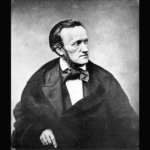Quote:
Now we want to sail across the sea in ships, to found a young Germany over here and over there, to fertilise it with the results of our struggle and striving, to father and educate the noblest, most godlike children: we want to do it better than the Spaniards did, to whom the new world a sanctimonious slaughterhouse, unlike the English, for whom she became a grocer’s box. We want to do it the glorious, German way […]
Source:
Carl Friedrich Glasenapp (1905): Das Leben Richard Wagners in sechs Bänden. 2. Bd. 1843-1853. Leipzig: Breitkopf und Härtel, p. 460.
Author Bio:
Richard Wagner (1813-1883) was a German composer, poet and writer. The quote comes from a speech before the Dresden Fatherland Association on the 15th of June, 1848. Amongst other things, he wrote the anti-Semitic book “Judaism and Music”.
Context:
 Even before the German Reich became a colonial power, enthusiasm for colonisation extended beyond the conservative circles which Richard Wagner frequented. Before Chancellor Bismarck invited the great European powers to Berlin in 1884 in order to divide up large parts of Africa between themselves, German princes and traders had had private colonies in Latin America, Africa and Asia. As early as 1683, a Kurbrandenburg colony was founded in present-day Ghana, a fortress that was an important settlement for Germans participating in the transatlantic slave trade. From 1528 to 1558, Venezuela was the “house colony” of the Welser banking house (Augsburg/Nuremberg). Other German merchants were also either involved in the slave trade or profited economically from it (Potts 1988: 18). After most of the colonies liberated themselves as a result of long struggles, colonial romanticism lived on in adventure novels and films (e.g., Out of Africa from 1985). Traces of these attitudes can also be found today in travel reports by young people from the Global North (glokal 2013).
Even before the German Reich became a colonial power, enthusiasm for colonisation extended beyond the conservative circles which Richard Wagner frequented. Before Chancellor Bismarck invited the great European powers to Berlin in 1884 in order to divide up large parts of Africa between themselves, German princes and traders had had private colonies in Latin America, Africa and Asia. As early as 1683, a Kurbrandenburg colony was founded in present-day Ghana, a fortress that was an important settlement for Germans participating in the transatlantic slave trade. From 1528 to 1558, Venezuela was the “house colony” of the Welser banking house (Augsburg/Nuremberg). Other German merchants were also either involved in the slave trade or profited economically from it (Potts 1988: 18). After most of the colonies liberated themselves as a result of long struggles, colonial romanticism lived on in adventure novels and films (e.g., Out of Africa from 1985). Traces of these attitudes can also be found today in travel reports by young people from the Global North (glokal 2013).Further Reading:
*Farish Ahmad-Noor (2019): Why is Colonialism (Still) Romanticised? Ted Talk.
*David Spurr (1993): The Rhetoric of Empire. Colonial Discourse in Journalism, Travel Writing and Imperial Administration. Durham & London: Duke University Press.
Year:
1853